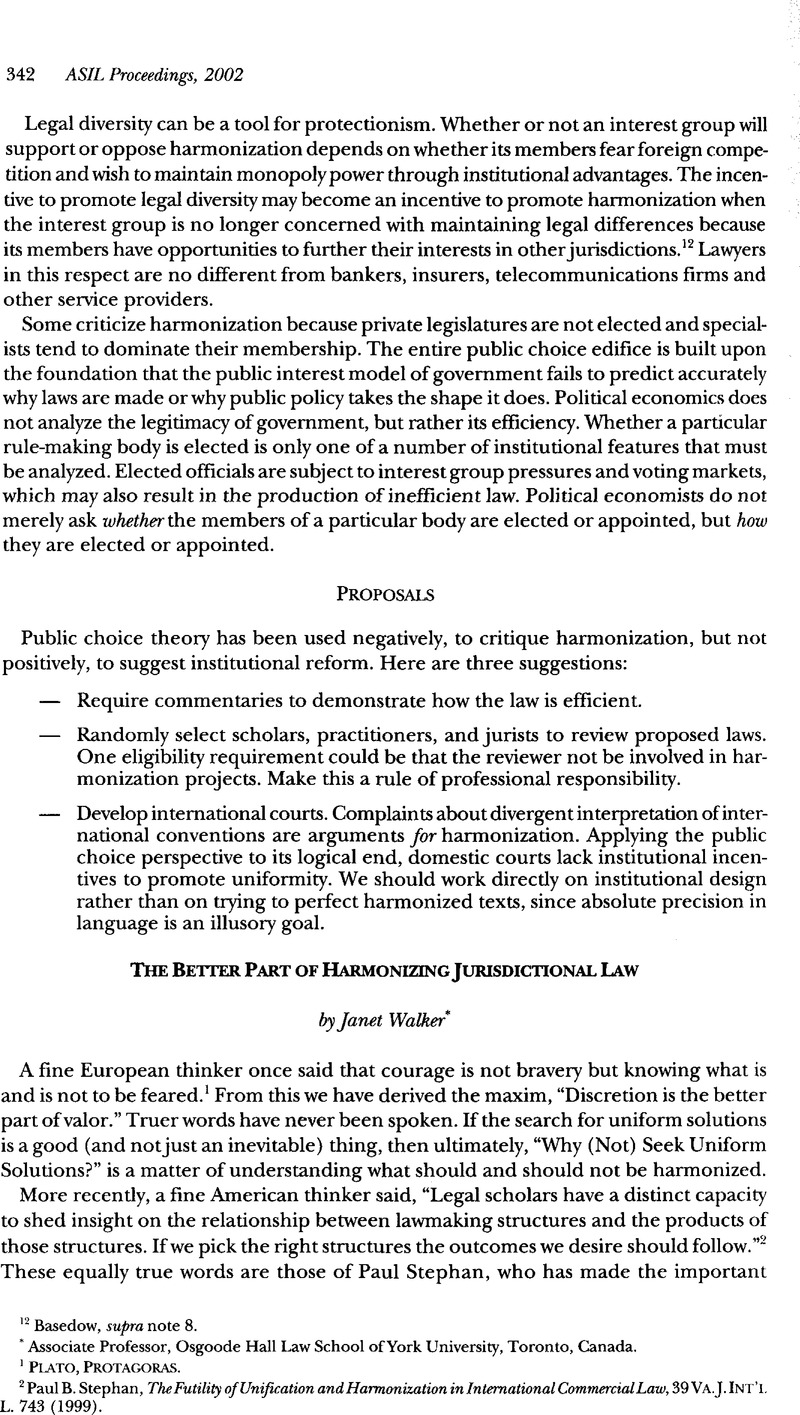No CrossRef data available.
Article contents
The Better Part of Harmonizing Jurisdictional Law
Published online by Cambridge University Press: 28 February 2017
Abstract

- Type
- Why (Not) Seek Uniform Solutions?
- Information
- Copyright
- Copyright © American Society of International Law 2002
References
1 Plato, Protagoras.
2 Stephan, Paul B., The Futility of Unification and Harmonization in International Commercial Law, 39 Va.J. Int’I, L. 743 (1999)Google Scholar.
3 Ibid.
4 I am not speaking here of flexibility that would permit the consensual pursuit of alternative outcomes—just uncertainty.
5 Professor Stephan considers whether this objective might be sought by legal experts more to enhance their own importance than for the good of the general public, but harmonized law is not necessarily more complex or obscure than unharmonized law, nor does it necessarily determine the need for professional legal advice, so I will not debate that here.
6 Stephan, supra note 3, at 748.
7 Though not with Professor Stephan’s nuanced appreciation of it.
8 The reference procedure to the European Court of Justice may be an exception to this distinction.
9 See, e.g., Juenger, Fritz, What’s Wrongxuith Forum Shopping? 16 Sydney L. Rev. 5 (1994)Google Scholar.
10 See, e.g., Opeskin, Brian R., The Price of Forum Shopping: A Reply to Professor Juenger, 16 Sydney L. Rev. 14 (1994)Google Scholar.
11 See Walter, Gerhard & Baumgartner, Samuel P., Utility and Feasibility of Transnational Rules of Civil Procedure: Some German and Swiss Reactions to the Hazard-Taruffo Project, 22 Texas Int’l L. J. 463 (1998)Google Scholar.
12 See, e.g., Breavington v. Godleman (1988) 169 C.L.R. 41, 80 Alr 362.
13 Tolofson v. Jensen [1994] 3 S.C.R. 1022, 120 D.L.R. (4th) 289.
14 Supra note 2.
15 See Hague Conference on Private International Law, Permanent Bureau, Preliminary Document 16, Some Reflections on the Present State of Negotiations on the Judgments Project in the Context of the Future Work Programme of the Conference (Feb. 2002); Preliminary Document 18, Choice of Court Agreements in International Litigation: Their Use and Legal Problems to Which They Give Rise in the Context of the Interim Text (Feb. 2002), available at <http://www.hcch.net/e/workprog/jdgm.html>.
16 Hague Conference on Private International Law, Preliminary Draft Convention on Jurisdiction and Foreign Judgments in Civil and Commercial Matters (Oct. 1999, rev’d June 2001), (as adopted by the Special Commission), available at <http://www.hcch.net/e/workprog/jdgm.html>.
17 The seminal case is Andrews v. Grand & Toy Alberta Ltd., [1978] 2 S.C.R. 229.
18 For Canadian examples, See Kidron v. Grean, [1996] 48 O.R.3d775; Beals v. Saldanha, [1998] 42 O.R.3d 127, rev’d, [2001] 54 O.R.3d 641.
19 Supra note 13.
20 In April 2002, in its Paris/New Delhi Principles on jurisdiction over Corporations, available at <http://www.ila-hq.org>, the International Law Association proposed that a corporation be subject to the jurisdiction of the courts of a state where “its business, or other professional activity is principally carried on” (emphasis added). It remains to be seen whether this formulation would be acceptable to those who might otherwise insist on business activities jurisdiction.
21 Hague Conference on Private International Law, Permanent Bureau, Preliminary Document 16, Some Reflections on the Present State of Negotiations on the Judgments Project in the Context of the Future Work Programme of the Conference (Feb. 2002), supra note 12.


